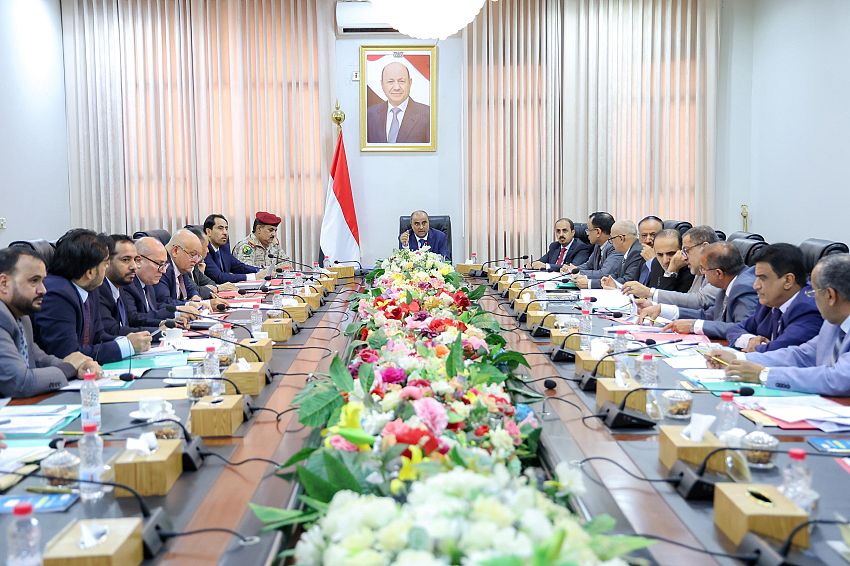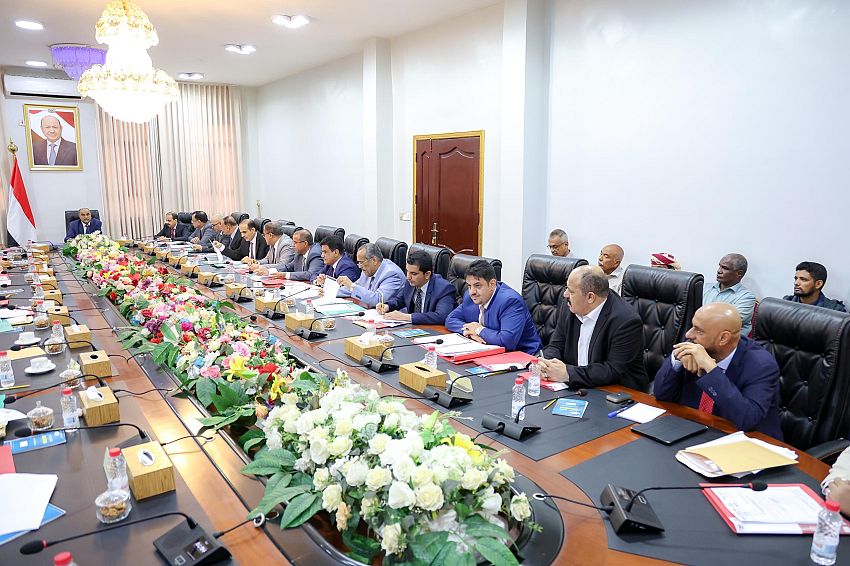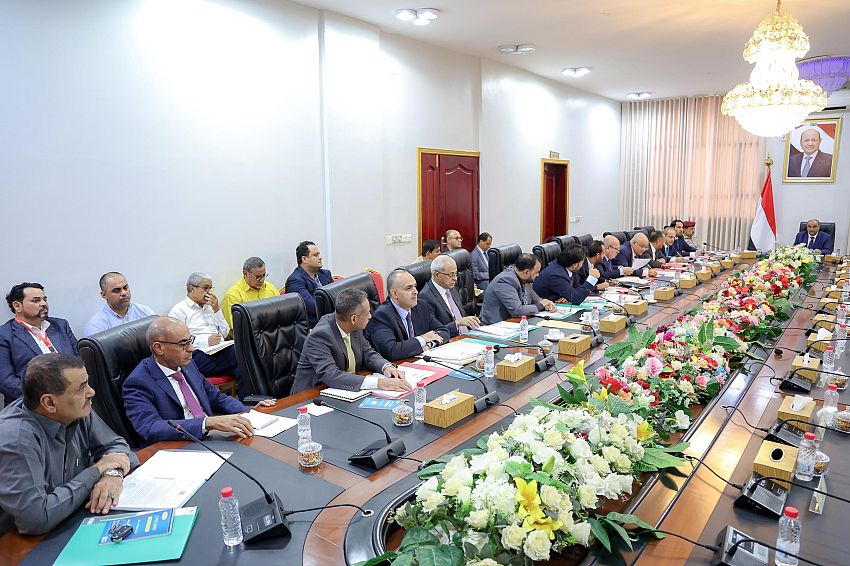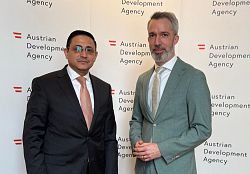
Yemen’s Ambassador Discusses Strengthening Development Cooperation with Austrian Development Agency
Yemen’s Ambassador to Austria, Haytham Shoja'adin, met on Friday with the Director of the Austrian Development Agency, Bernd Brunner, to discuss ways to enhance and advance development cooperation between the two friendly countries.
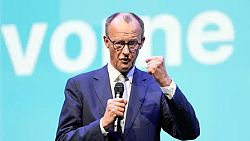
German Chancellor Says Europe Must Stand Strong
German Chancellor Friedrich Merz has called on Europeans to strive for greater autonomy, emphasizing the need for Europe to defend itself using its own capabilities, given the shift in transatlantic relations.
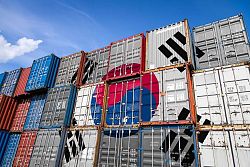
Korea large companies' exports rise 10 percent
Large companies' exports in South Korea rose approximately 10 percent year-on-year in the fourth quarter of last year, driven by increased global demand for semiconductors.

Saudi League: Al-Nassr, Al-Ettifaq and Neom Secure Victories Over Al-Ittihad, Damac and Al-Riyadh
Al-Nassr defeated its guest Al-Ittihad 2–0 in the match that brought them together at Al-Awwal Park Stadium in Riyadh, as part of the 21st round of the Saudi Professional League.
Last Update: ،
2026/02/21
Time
09:07:46
Latest News:
 Yemeni Leadership Condemns Attempts to Disrupt State Institutions and Vows to Maintain Order
Yemeni Leadership Condemns Attempts to Disrupt State Institutions and Vows to Maintain Order
 Stability of Aden cornerstone for eliminating the coup—Lieutenant General al-Subaihi stressed
Stability of Aden cornerstone for eliminating the coup—Lieutenant General al-Subaihi stressed
 Government Holds its First Meeting
Government Holds its First Meeting
 Yemeni Ambassador Explores Ways to Boost Cultural Cooperation with Indonesian Minister
Yemeni Ambassador Explores Ways to Boost Cultural Cooperation with Indonesian Minister
 Yemeni Ambassador Discusses Boosting Judicial Cooperation with Moroccan Prosecutor General
Yemeni Ambassador Discusses Boosting Judicial Cooperation with Moroccan Prosecutor General
Latest News:
 Yemeni Leadership Condemns Attempts to Disrupt State Institutions and Vows to Maintain Order
Yemeni Leadership Condemns Attempts to Disrupt State Institutions and Vows to Maintain Order
 Stability of Aden cornerstone for eliminating the coup—Lieutenant General al-Subaihi stressed
Stability of Aden cornerstone for eliminating the coup—Lieutenant General al-Subaihi stressed
 Government Holds its First Meeting
Government Holds its First Meeting
 Yemeni Ambassador Explores Ways to Boost Cultural Cooperation with Indonesian Minister
Yemeni Ambassador Explores Ways to Boost Cultural Cooperation with Indonesian Minister
 Yemeni Ambassador Discusses Boosting Judicial Cooperation with Moroccan Prosecutor General
Yemeni Ambassador Discusses Boosting Judicial Cooperation with Moroccan Prosecutor General
Cabinet approves package of measures to address electricity crisis
[06/07/2025 07:19]
ADEN - SABA
Prime Minister Salem Saleh bin Breik chaired an extraordinary meeting Sunday for the Cabinet discussing electricity crisis and the prolonged and repeated outages that have exacerbated the suffering of citizens in Aden and the liberated governorates, particularly in light of rising temperatures.
The meeting aimed to find urgent solutions and possible alternatives to address the deterioration in this vital sector.
Based on discussions and reports presented, the meeting approved a package of urgent measures, primarily including the provision of emergency fuel supplies for power generation stations in Aden, increasing daily allocations of crude oil and local diesel, and securing sufficient quantities to ensure a strategic reserve that covers the stations' needs for at least a month in anticipation of any emergencies.
The meeting emphasized the importance of ministries and relevant authorities fulfilling their responsibilities in transporting fuel to the generation stations and enhancing effective oversight of the distribution process to ensure efficient usage, which would help reduce outage hours and alleviate citizens' suffering.
The Cabinet reviewed several reports submitted by the Minister of Electricity, in the presence of various technicians and specialists from the ministry and the General Electricity Corporation and Aden Electricity, as well as the executive directors of PetroMasila and Safer Exploration and Production Company.
The reports detailed the current status of the electrical system in terms of infrastructure, current conditions, challenges it faces, required urgent interventions and unconventional mechanisms to address them.
They also included proposed visions and ideas to enhance efficiency in production, distribution and collection, as well as to find economically viable alternatives for electricity generation using less costly fuels.
The reports highlighted the generation situation and projects related to transmission and distribution, including projects funded by Yemen’s partners, and mechanisms for utilizing available funding from donors to improve electricity service and meet the increasing demand.
Additionally, the master plan for the electricity sector, financed by the World Bank and several donors, was presented, along with the executive procedures it includes to ensure strategic planning for the advancement of this sector. The council affirmed its support for this plan as a strategic measure for the sector's recovery and the importance of working on the proposed projects as an emergency phase.
The council reiterated the government's openness to forming strategic partnerships with the private sector in electricity (generation, transmission, distribution) and coordinating with the Presidential Leadership Council to establish regulations and legislation that guarantee the success of this partnership, including partnerships under the Build-Operate-Transfer(BOT) and Independent Power Producer (IPP) models, among other financing and implementation models.
It highlighted the importance of partnership with the private sector in energy, following transparent and clear frameworks and opening the door for competition in this area, establishing clear foundations for partnerships, including the enactment of the public-private partnership law, to help meet the increasing energy needs in Yemen and affirm the private sector's influential presence in the service field.
The council also emphasized its commitment to attracting local, regional and international investments and building partnerships with donor countries, organizations and the private sector to develop viable and strategic projects and solutions in the electricity sector that meet citizens' needs and support development, thereby implementing genuine reforms in this sector.
The meeting discussed several proposals and incentives to encourage the use of renewable energy and expand investment in it, including solar and wind energy. It noted ongoing and completed projects for solar electricity generation in Aden, Al-Mukha, Shabwa, Hadhramaut, Lahij, Taiz, and Al-Hudaydah, emphasizing the importance of completing solar energy systems for schools and health centers.
The meeting called on partners from donor countries and organizations to support the government in harnessing Yemen's great potential for generating electricity from renewable energy sources, which would help provide fundamental solutions to the electricity problem.
At the end of the session, the Prime Minister reiterated that the government is doing everything in its power under extremely difficult circumstances but will not use challenges as an excuse for inaction.
He stressed that the top priority now is to alleviate citizens' suffering and achieve gradual stability in electricity service. He said, "We will not stop at diagnosis but will move towards implementation according to the available resources, and we will hold accountable anyone who falls short. This is our responsibility before God and before the people."
Prime Minister Salem Saleh bin Breik chaired an extraordinary meeting Sunday for the Cabinet discussing electricity crisis and the prolonged and repeated outages that have exacerbated the suffering of citizens in Aden and the liberated governorates, particularly in light of rising temperatures.
The meeting aimed to find urgent solutions and possible alternatives to address the deterioration in this vital sector.
Based on discussions and reports presented, the meeting approved a package of urgent measures, primarily including the provision of emergency fuel supplies for power generation stations in Aden, increasing daily allocations of crude oil and local diesel, and securing sufficient quantities to ensure a strategic reserve that covers the stations' needs for at least a month in anticipation of any emergencies.
The meeting emphasized the importance of ministries and relevant authorities fulfilling their responsibilities in transporting fuel to the generation stations and enhancing effective oversight of the distribution process to ensure efficient usage, which would help reduce outage hours and alleviate citizens' suffering.
The Cabinet reviewed several reports submitted by the Minister of Electricity, in the presence of various technicians and specialists from the ministry and the General Electricity Corporation and Aden Electricity, as well as the executive directors of PetroMasila and Safer Exploration and Production Company.
The reports detailed the current status of the electrical system in terms of infrastructure, current conditions, challenges it faces, required urgent interventions and unconventional mechanisms to address them.
They also included proposed visions and ideas to enhance efficiency in production, distribution and collection, as well as to find economically viable alternatives for electricity generation using less costly fuels.
The reports highlighted the generation situation and projects related to transmission and distribution, including projects funded by Yemen’s partners, and mechanisms for utilizing available funding from donors to improve electricity service and meet the increasing demand.
Additionally, the master plan for the electricity sector, financed by the World Bank and several donors, was presented, along with the executive procedures it includes to ensure strategic planning for the advancement of this sector. The council affirmed its support for this plan as a strategic measure for the sector's recovery and the importance of working on the proposed projects as an emergency phase.
The council reiterated the government's openness to forming strategic partnerships with the private sector in electricity (generation, transmission, distribution) and coordinating with the Presidential Leadership Council to establish regulations and legislation that guarantee the success of this partnership, including partnerships under the Build-Operate-Transfer(BOT) and Independent Power Producer (IPP) models, among other financing and implementation models.
It highlighted the importance of partnership with the private sector in energy, following transparent and clear frameworks and opening the door for competition in this area, establishing clear foundations for partnerships, including the enactment of the public-private partnership law, to help meet the increasing energy needs in Yemen and affirm the private sector's influential presence in the service field.
The council also emphasized its commitment to attracting local, regional and international investments and building partnerships with donor countries, organizations and the private sector to develop viable and strategic projects and solutions in the electricity sector that meet citizens' needs and support development, thereby implementing genuine reforms in this sector.
The meeting discussed several proposals and incentives to encourage the use of renewable energy and expand investment in it, including solar and wind energy. It noted ongoing and completed projects for solar electricity generation in Aden, Al-Mukha, Shabwa, Hadhramaut, Lahij, Taiz, and Al-Hudaydah, emphasizing the importance of completing solar energy systems for schools and health centers.
The meeting called on partners from donor countries and organizations to support the government in harnessing Yemen's great potential for generating electricity from renewable energy sources, which would help provide fundamental solutions to the electricity problem.
At the end of the session, the Prime Minister reiterated that the government is doing everything in its power under extremely difficult circumstances but will not use challenges as an excuse for inaction.
He stressed that the top priority now is to alleviate citizens' suffering and achieve gradual stability in electricity service. He said, "We will not stop at diagnosis but will move towards implementation according to the available resources, and we will hold accountable anyone who falls short. This is our responsibility before God and before the people."
Key words:
responsibilities - Additionally - infrastructure - unconventional - responsibility - implementation - deterioration - international - organizations - interventions - Yemen’s Ambassador Discusses Strengthening Development Cooperation with Austrian Development Agency
Yemen’s Ambassador Discusses Strengthening Development Cooperation with Austrian Development Agency Yemeni Leadership Condemns Attempts to Disrupt State Institutions and Vows to Maintain Order
Yemeni Leadership Condemns Attempts to Disrupt State Institutions and Vows to Maintain Order Stability of Aden cornerstone for eliminating the coup—Lieutenant General al-Subaihi stressed
Stability of Aden cornerstone for eliminating the coup—Lieutenant General al-Subaihi stressed  Government Holds its First Meeting
Government Holds its First Meeting  Yemeni Ambassador Explores Ways to Boost Cultural Cooperation with Indonesian Minister
Yemeni Ambassador Explores Ways to Boost Cultural Cooperation with Indonesian Minister Yemeni Ambassador Discusses Boosting Judicial Cooperation with Moroccan Prosecutor General
Yemeni Ambassador Discusses Boosting Judicial Cooperation with Moroccan Prosecutor General Yemen's Health Ministry Boosts Cooperation with WHO to Enhance Epidemiological Surveillance
Yemen's Health Ministry Boosts Cooperation with WHO to Enhance Epidemiological Surveillance Yemen’s Ambassador Discusses Cultural Property Protection Cooperation with Swiss Federal Office Director
Yemen’s Ambassador Discusses Cultural Property Protection Cooperation with Swiss Federal Office Director Yemeni Ambassador Discusses Boosting Cooperation with Sudanese Official
Yemeni Ambassador Discusses Boosting Cooperation with Sudanese Official Yemeni Minister Emphasizes Duty to Boost Technical Education Amidst Challenges
Yemeni Minister Emphasizes Duty to Boost Technical Education Amidst Challenges